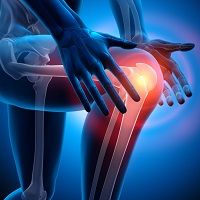Article
For Patients with Knee Osteoarthritis…Treat the Brain?
Author(s):
Knee osteoarthritis (OA) sufferers experience more than just pain and changes to their cartilage, bone, ligaments, and muscles in the surrounding area. They also often experience changes in the sensory and motor function of the knee.

Knee osteoarthritis (OA) sufferers experience more than just pain and changes to their cartilage, bone, ligaments, and muscles in the surrounding area. They also often experience changes in the sensory and motor function of the knee. It is not well understood why such changes take place. A study in Arthritis Research & Therapy suggests that to treat this issue, rheumatologists and other physicians might have to look far north of the knee, to the field general of movement: the brain.
Changes to motor control in the knee can include alterations to gait and muscle activation patterns, weakness in the quadriceps muscle, and impaired proprioception. These responses are coordinated by the motor and sensory regions of the cerebral cortex. So, the study posited, if a link between changes to the cortex could be made to motor behavior changes in patients with knee OA, this could open the door to a new treatment avenue.
The study involved a small cohort of patients with moderate to severe right knee OA and a control group. The participants performed 3 visually guided, variable force, force matching motor tasks involving isolated isometric muscle contractions of the quadriceps, the angle, and finger muscles. After a series of manipulations, the researchers discovered a significant shift in the representation of the knee in the patients with OA. They also found that poorer performance of the knee activities correlated to more anterior placement of the motor cortex loci in those with knee OA.
“These data provide novel evidence that organization of the motor cortex differs in knee OA,” according to the study authors. “Notably, the results of the statistical analysis indicate that the inherent variation within groups was less than the mean difference in location between groups. This implies that the effect of knee OA was greater than small differences between individuals.”
Further research is needed to fully establish a causal relationship between differing motor cortex organization and the changes to motor control in knee OA. Even if this relationship is further established, it will be a long way from there to clinical testing of treatments that target areas of the brain in a way that would ameliorate the changes in motor function.
“Better understanding of the causal relationships along with the current results indicating remodeling of the motor cortex associated with knee OA may provide direction for future treatments of knee OA,” the researchers noted, “as there are documented associations between treatments that contribute to normalization of cortical organization and improvement of symptoms in other chronic pain and musculoskeletal conditions.”





